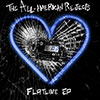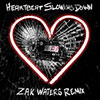We caught up with All-American Rejects lead singer Tyson Ritter while on the road promoting AAR's latest album, Kids in the Street. In this exclusive video, Ritter tells us about the recording process, his love of Fender basses, the test of a great song, and more.
Your album Kids in the Street was recorded with Greg Wells, who's worked with such acts as Adele and Katy Perry. What was it like balancing your rock sound with his more pop background?
Greg is like a chameleon; he can sort of blend into whatever scenario he's working with. The main reason why I really loved him was that Mika record he did. It sounded incredible. It had all sorts of different things on it that I never heard before. It just sounded really beautifully recorded. So balancing the pop of Greg with the pop-rock of us really wasn't that difficult. He was more like a fifth member.
Tell us about the recording process for Kids in the Street.
We had a really conscious effort to incorporate keyboards in the studio a lot more -- just because they were around, really. Every day we'd sort of walk in and start tooling on them, to whatever we did the night before. We recorded live a lot on this record...capturing it as a band, all together on a song -- like on a song called "Out The Door," we did live together. And the first song on the record, a song called "All Days Gone," we did all live. It was great.
What's your favorite track on the album?
My favorite track on the record is our new single, called "Heartbeat Slowing Down." And it's sort of the bookmark of the record. It really is a turning point where this sort of grand sound comes out through this ballad that is a bleeding heart for the record. I think it's one of our greatest songs that we've ever written as a band.
We're digging the electro version of "Heartbeat Slowing Down" on your Flatline EP. What influences do you look to when working on something in that genre?
Can a good song be dressed any way you want? That's the test of a great song. You can dress it up as a reggae song; we've heard that version of "Move Along" and it's incredible. And you can dress it up as a country song -- cool. However you dress a song, if it has staying power, then it works. The Flatline EP is something I'm really proud of because it just sort of seamlessly shows that in that application, these songs still ring true. And they're really fun. I really took a spin on the song that actually made it happy, instead of so anthemically melancholy.
What's one song you'd love to cover but haven't?
One song I would love to cover that we've always messed around with at soundcheck is just Pixies' "Where Is My Mind?" I just think it's fun, and I think the band can do it, so it's cool every time we try.
You've played a number of Fender basses with AAR, including both Jazz and Precision models. How do you decide which is right for what occasion? What sort of tones do your different Fenders offer?
I was kind of torn whenever I got the Jazz bass because it played beautifully, but it didn't have the beefy bottom that I love on a P bass -- or, I guess the "dirty" bottom that a P bass has. It's got a round, clear, bottom... You know, every song, we play a different bass. It's not like we record with P basses the whole time. So I think it depends on getting as close to the sound we achieved on the record. That's what discerns what bass we use.
What was your first piece of gear? What advice would you give to younger players just starting out?
My dad bought me a Razor guitar. It looked like a Strat. It was like a hundred bucks at a pawn shop. I learned as much as I could on that thing. To younger players just starting out, I would say, just play out. That was the only thing that ever worked for us, when we played shows out in the city and in the surrounding cities, and wherever. We were inventive -- we played 24-hour relays, we played jungle gyms, we played whatever. We played any place that would have us. So, just play out!
You've been on a pretty extensive touring schedule; what are some of your favorite cities to pass through?
My favorite city in the world is Barcelona, Spain. It's heaven on earth, and you should go there if you ever get a chance. Get a boat! Get a small boat and enough provisions for two weeks to cross the Atlantic.
You're stuck on a desert island, but you can take one instrument or piece of equipment with you. What do you take?
I'm stuck on a desert island? For one day, or for forever?
For the rest of your life.
Crap. I would probably take just an acoustic guitar, 'cause you could probably catch a fish in the soundhole as well, so that's two for one!


